
All categories
Featured selections
Trade Assurance
Buyer Central
Help Center
Get the app
Become a supplier

(49 products available)


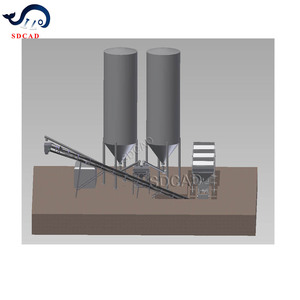

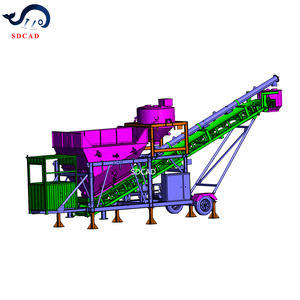










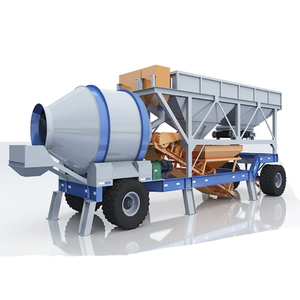









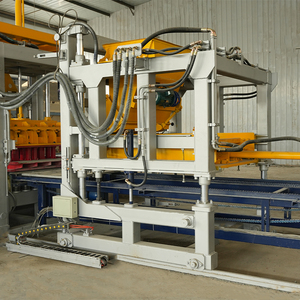







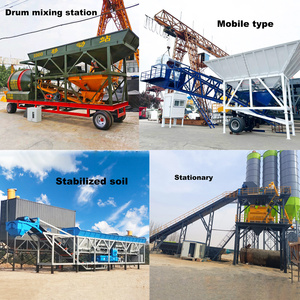






There are different types of ready mix concrete price per m3, depending on the use and requirement. The three main types are the volumetric, standard mix, and controlled design.
Standard mixes
The CCompartments of standard mixes, the strengths, and the ratios are all specified by the IS code. The mixes are made of plastic or flowable concrete. However, except for the C10, C15, and C20, all the other mixes need to be in line with the codes to get the specified C20 strength.
Controlled Design
Controlled design mixes are produced as per the client's requirements and needs. In this case, the end user wants a concrete mix with specific characteristics. The strength, workability, durability, and other factors will influence the control on the concrete when it is being designed.
Volumetric mixes
Ready-mixed volumetric concrete relies on measurements to supply accurate mixes on-site. The ingredients are proportioned and loaded into the mixer based on volume instead of weight. This method ensures consistency and precision in the mixture. Additionally, it allows for flexibility in adjusting the quantity of concrete produced at the location. Delays between mixing and pouring time are reduced with volumetric mixing as well.
Some other types of ready mix concrete are:
Shrinkage-compensating concrete
Shrinkage-compensating concrete is intended to counteract shrinkage, which is a common occurrence in traditional concrete. The mix incorporates specific types of expansive cements and additives that induce a slight expansion over time, thereby offsetting any potential shrinkage.
Lightweight concrete
Lightweight concrete has been developed to possess a lower density in comparison to standard concrete. This is achieved by incorporating lightweight aggregates or admixtures that reduce the mix's overall weight without compromising its structural integrity.
Fiber-reinforced concrete
Concrete that has been reinforced with fibers is produced by adding distinct types of fibers, such as steel, synthetic, or natural fibers, into the mix. These fibers improve the concrete's tensile strength and resistance to cracking, as well as increase its durability and impact resistance.
Concrete Types
Ready-mix concrete producers provide a variety of concrete mixes tailored to distinct applications. The three primary types are:
Design Mix:
Production of concrete using a predetermined mixture. Once produced, it is utilized for a variety of applications.
On-Site Mix:
Added materials will be utilized for production in this instance, which is usually more expensive than the other two methods.
Unlimited Mix:
A predefined combination used for particular applications where the mixture must adhere to predetermined specifications. Uniform concrete strength is attained with the aid of an extensive quality control procedure.
Additional Ingredients
Ready-mix concrete may also include additives, such as fly ash, plasticizers, retardants, silica fume, and accelerators, to improve performance, increase workability, adjust setting time, and enhance durability, depending on the unique requirements of an application. These mixtures can provide the concrete with extra toughness, flexibility, or resistance to particular environmental circumstances, such as low temperatures or aggressive chemicals.
Final Curve Graphs
The performance of ready-mix concrete can be cataloged and tracked using the final curve graphs.
Daily Premix Truck Wash:
Premix trucks should be washed out daily. Customers must adhere to scheduling limitations if they plan to have their trucks washed out on commercial premises where other customers can hold an average of 200 gallons of water.
Preventive Maintenance Program:
Consider the operational and environmental circumstances when choosing the maintenance program's frequency to ensure the equipment is operating effectively and to help achieve long-term performance and reliability.
Electrical System Components:
Consider the battery, its terminals and cables, wiring connections and routing, switches and fuses, the starter and alternator, and other accessory drives.
Pneumatics and Hydraulics:
It is essential to consider the pump and actuator, the high and low-pressure hoses, the routing and attachments, the flow control and pressure control valves, and other system components.
Driveline Components:
It is vital to consider the components of the drives, such as the propeller, universal joints and centra, the drives, the gearbox or transmission, the gearbox, and the axle and wheel bearings.
Other Components:
Consider items such as the bucket and conveyor belt and the cement silos, scales, flow control valves, and pressure control valves.
Ready mix concrete is a solution for a number of situations. Some usage scenarios include:
Huge Construction Projects
Ready mix concrete is made in large quantities, so it is great for big construction projects that need a lot of concrete. It is good for building airports, parking lots, bridges, dams, and other large infrastructure projects.
High-Rise Buildings and Complex Structures
Ready mix concrete is suitable for high-rise buildings and complex shapes. Its precise mix design enables builders to meet structural and architectural requirements. Ready mix concrete is appropriate for large construction projects that need a lot of concrete to be made in a short amount of time. Its good workability makes it easy to use in complicated shapes and tight places, reducing labor costs.
Speedy Construction Tasks
Ready mix concrete is great for fast construction tasks like house construction and road cement work. It is made in large quantities with consistent quality, so workers can pour it right away and not stop.
Eco-Friendly Constructions
Ready mix concrete can satisfy different eco-friendly construction project standards and reduce carbon emissions. It can also be reused or recycled. Ready mix concrete is a solution for many construction scenarios. Its precision mixing, large quantities, quick setup time, and flexibility can meet various engineering project needs and help builders finish their jobs faster.
Ready mix concrete is not like other concretes because it is mixed at an industrial facility before being transported to the construction site. The price of ready-mix concrete can fluctuate depending on the material's availability, distance from the factory, and variations of the concrete mix needed for the specific project.
Business buyers can choose the price per cubic meter by requesting prices for specific types of ready-mix concrete. When doing so, business buyers should understand what factors might impact the price they will receive when the quote is requested. Knowing these factors and what they are will help business buyers make an informed decision and also help a little when negotiating for a better price with the supplier.
Know the RMC Ingredients :
The ingredients of ready-mix concrete include water, fine aggregates like sand, coarse aggregates like gravel, cement, admixtures, etc., and the mix ratio. The item's availability, distance to location, and property will influence the prices of these materials. For example, marble powder will be more expensive than limestone powder. Likewise, gravel will be more expensive than sand, and cement will always be more expensive than both.
Know which type of RMC is needed:
The price will vary depending on different types of ready-mix concrete, general and high-strength(raw) concrete. For example, high-strength concrete will be more expensive than low-strength or ordinary ready-mix concrete. The specific project requirement also affects the type business buyers need.
How much volume of RMC they need :
The more quantity required, the more business buyers will save in cost. However, the minimum amount needed for suppliers to process an order is usually three cubic meters. Business buyers will have to pay a higher price if they need less than that.
Distance from RMC Manufacturer :
The transportation cost charged is also based on how far the supplier is from the construction site or ready-mix concrete production facility. A longer distance will mean a higher cost. Business buyers can save on costs if they choose a supplier near the project site.
Labour cost for concreting:
This involves the number of trucks needed to deliver the concrete to the site. The more trucks needed, the higher the cost. Large projects usually need more trucks, and a higher volume of concrete will be needed to sustain the project.
Q1: Why does the ready mix concrete price differ for different types of concrete?
A1: The price of ready mix concrete differs depending on the concrete's grade and type. For instance, ready-mix concrete with specific qualities and durability designed for high-performance applications will probably cost more. Moreover, special add-ons like translucent, self-healing, or anti-deterioration qualities will increase the ready-mix concrete price per m3.
Q2: How far in advance should a ready mix concrete order be placed?
A2: It's usually best to place the order at least 48 hours in advance. But, for large or specialized projects, ordering a few weeks ahead is better.
Q3: Are there discounts for bulk orders of ready-mix concrete?
A3: Some suppliers offer discounts for bulk orders. It's best to consult the supplier to get the details.
Q4: What is the most crucial factor that affects ready mix concrete pricing?
A4: Transportation costs significantly impact the ready mix concrete price. The farther the mixing plant is from the job site, the higher the transportation costs.
Q5: What is the best way to compare ready mix concrete prices from different suppliers?
A5: The most effective method to compare prices is to request detailed quotations from different suppliers, including their concrete specifications. Then, compare the costs while considering the additional transportation and pump costs.